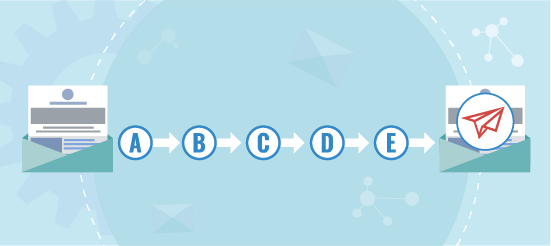Email deliverability can be a pretty touch subject to grasp. With this in mind we recently published a primer on getting to grips with email deliverability basics.
We thought we’d follow up this week by delving a little deeper into the nitty-gritty of how email deliverability works. Deliverability lingo such as ‘SSL’ and ‘cold IPs’ can be a little alien if you’re a beginner so we’ve compared the deliverability process with something that every business is familiar with – the recruitment process.
Recruitment Process
Let’s start with a quick overview of the recruitment process (and a little imagination). You’re now the head of recruitment at your company (you’re on more pay too, congratulations!). I’d like you to spend a minute thinking about questions and scenarios you’d put to prospective candidates to ensure you get the right person for company.
You’ll probably have a few of the following terms pop-up in your mind.
| Skills/Qualities | Does each candidate meet the skills and requirements for the role? |
| Experience | Does the candidate have experience or are they a fresh starter? |
| Verification/Authentication | Do you have questions/tests to verify that each candidate can do their job? |
| References | Can you get references from previous employers? |
| Personality |
Does each candidate dress and communicate appropriately? |
| Trust | Can the candidate be trusted? Is their identity is correct? |
Now let’s compare the recruitment terms with some of the more in-depth email deliverability lingo – you’ll be surprised how much both processes have in common. Don’t worry if you don’t understand it all, we’ll go though it all in just a second.
| Recruitment terms | Email Deliverability terms | Description |
| Skills/Qualities | Email Standards | RFC Standards, Email encoding standards |
| Experience | IP/Domain Reputation | IP reputation( warm or cold IP),domain reputation |
| Verification/Authentication | Email Authentications | Email authentication e.g Domain keys, SPF, Sender ID, DMARC, SSL etc |
| References | Third Party Verification | Checking IP/Domain reputation through other providers e.g. Spamhaus, Sorbs, SpamCop, Return path, Microsoft etc |
| Personality | Template design and content |
Template design, layout, and email content. |
| Trust | SSL, Email Authentications | An email server uses the points above to decide whether to trust an email or not. Trust can also be enhanced by using SSL authentication in emails. |
Now lets compare each term individually below:
Email Standards
Recruitment
The very first step of the recruitment process is to assess each candidate via their CV to ensure they fulfil the job requirements.
Email Deliverability
Email goes thought a similar check once it’s received. The email server will check that the email is built using the right code and has a valid structure before proceeding to the next stage. The structure must be built according to RFC standards and must use the correct encoding techniques.
IP/Domain Reputation
Recruitment
Once you’re happy with the candidate’s skill set, you’ll want to check the they have built up enough experience in order to carry out their job.
Email Deliverability
After an email’s standards have been verified, its reputation will be checked by looking where it ‘s been sent from. This is known as an IP address reputation check (What on earth is an IP?). If the IP address has a solid history of sending legitimate email it’s onto the next step.
Authentication
Recruitment
Some candidates may be guilty of, well, embellishing the truth in their CV. The next stage of their recruitment will involve testing them to make sure they’re genuine.
Email Deliverability
Just like job candidates, it’s also possible for emails to fib about their origins. Modern email uses built-in code (Domain Keys, SPF records, DMARC etc…) to prove that they are from where they say they are.
Third Party Verification
Recruitment
Next up, you’ll want to verify each candidate’s experience by getting in touch with their previous employers and checking them with specific agencies.
Email Deliverability
The same is true with email. IP addresses and domains can be checked with 3rd party providers (Spamhaus, Sorbs, SpamCop, Return Path, Microsoft) to ensure that they are genuine.
Template Design and Content
Recruitment
How a candidate presents themselves is also very important in the recruitment process. You’ll want to check their attire, appearance, communication skills, personality etc…
Email Deliverability
Email content scanning works in a similar fashion. Many servers check for objectionable content (explicit language, viruses in attachments, spammy content etc…) before delivering an email to the intended inbox.
SSL, Email Authentications
Recruitment
Once the checks above have all been approved, the candidate will have landed their dream job. Whilst working for the business, they’ll build a reputation amongst their fellow employees, opening up more opportunities for them in the future.
Email Deliverability
Exactly the same can be said of an email program. Once the first email has been accepted by an email server, each subsequent email will earn it trust – improving its chances of deliverability in the future.
However, just because a candidate has been hired does not guarantee them their position forever. Just like an email program, they must work hard to maintain their good reputation and ensure they keep their job/keep getting let into the inbox.









